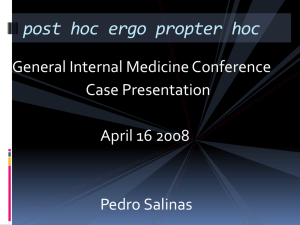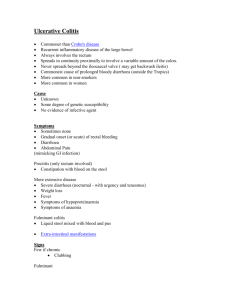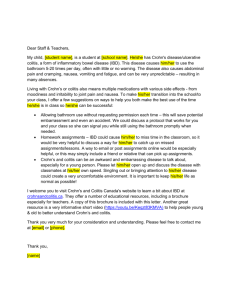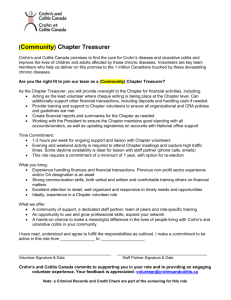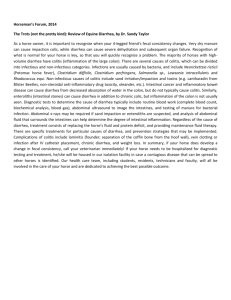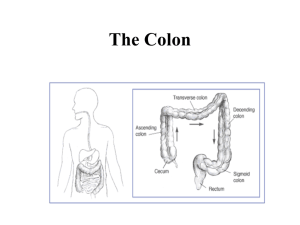Colitis - Briarpointe Veterinary Clinic
advertisement
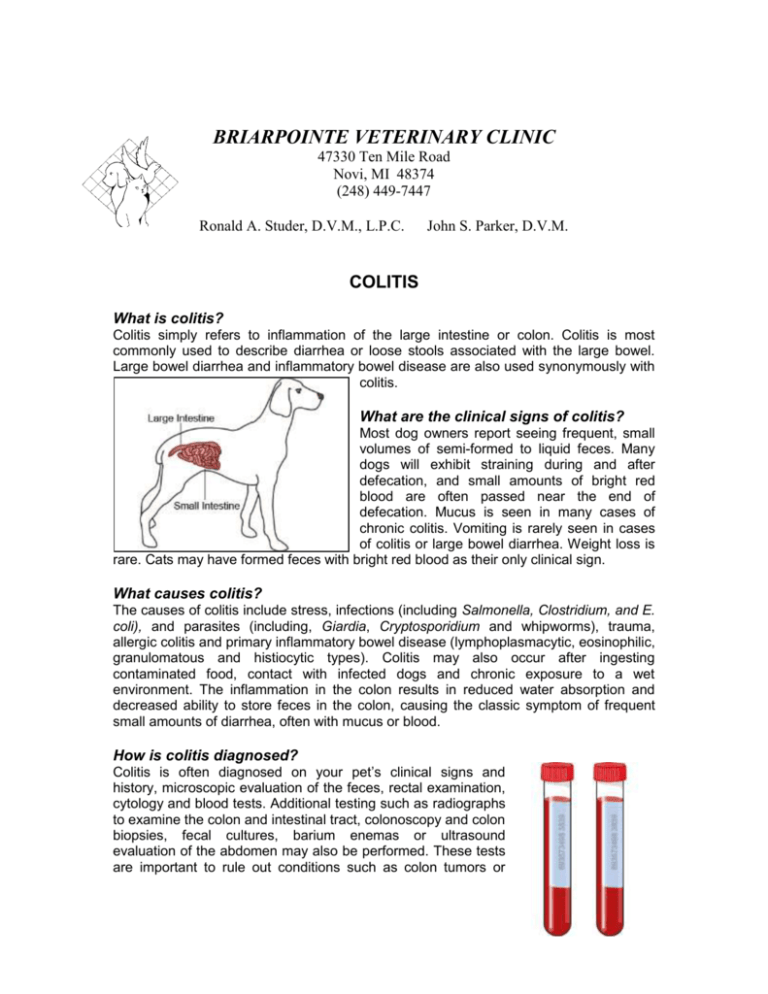
BRIARPOINTE VETERINARY CLINIC 47330 Ten Mile Road Novi, MI 48374 (248) 449-7447 Ronald A. Studer, D.V.M., L.P.C. John S. Parker, D.V.M. COLITIS What is colitis? Colitis simply refers to inflammation of the large intestine or colon. Colitis is most commonly used to describe diarrhea or loose stools associated with the large bowel. Large bowel diarrhea and inflammatory bowel disease are also used synonymously with colitis. What are the clinical signs of colitis? Most dog owners report seeing frequent, small volumes of semi-formed to liquid feces. Many dogs will exhibit straining during and after defecation, and small amounts of bright red blood are often passed near the end of defecation. Mucus is seen in many cases of chronic colitis. Vomiting is rarely seen in cases of colitis or large bowel diarrhea. Weight loss is rare. Cats may have formed feces with bright red blood as their only clinical sign. What causes colitis? The causes of colitis include stress, infections (including Salmonella, Clostridium, and E. coli), and parasites (including, Giardia, Cryptosporidium and whipworms), trauma, allergic colitis and primary inflammatory bowel disease (lymphoplasmacytic, eosinophilic, granulomatous and histiocytic types). Colitis may also occur after ingesting contaminated food, contact with infected dogs and chronic exposure to a wet environment. The inflammation in the colon results in reduced water absorption and decreased ability to store feces in the colon, causing the classic symptom of frequent small amounts of diarrhea, often with mucus or blood. How is colitis diagnosed? Colitis is often diagnosed on your pet’s clinical signs and history, microscopic evaluation of the feces, rectal examination, cytology and blood tests. Additional testing such as radiographs to examine the colon and intestinal tract, colonoscopy and colon biopsies, fecal cultures, barium enemas or ultrasound evaluation of the abdomen may also be performed. These tests are important to rule out conditions such as colon tumors or polyps, irritable bowel syndrome, cecal inversion and ileocecocolic intussusception. How is colitis treated? Treatment is directed at the specific cause of colitis, but often includes fasting for 24-48 hours, feeding a low residue or hypoallergenic diet, increasing dietary fiber content, adding fermentable fiber such as psyllium or a diet containing beet pulp or fructooligosaccharides. Antimicrobial drugs such as fenbendazole, metronidazole, and fluroquinolones may be indicated based on your dog’s diagnosis. Anti-inflammatory or immunosuppressive drugs such as sulfasalazine, prednisone, and azathioprine are also used in cases of inflammatory or immune-mediated colitis. Drugs that modify the colon’s motility, including loperamide, diphenoxylate and propantheline bromide, may provide symptomatic relief. In some cases of repeated stress-induced colitis (such as boarding), we will prescribe medication to be given a day or so before, during and for several days after boarding. What is the prognosis if my dog has colitis? For most dogs diagnosed with colitis, the prognosis is excellent for a speedy recovery. Stress colitis is one of the leading causes of colitis in dogs and with a simple change in diet and medication to resolve the inflammation or infection in the colon; most dogs are back to normal within three to five days. Chronic, severe or recurrent cases should have further diagnostic tests performed to determine the exact cause and proper treatment. For many dogs with chronic colitis, strict dietary control and judiciously used medications allow for a normal quality of life. Edited by John S. Parker, DVM July, 2007 © Copyright 2005 Lifelearn Inc. Used with permission under license. February 15, 2016
